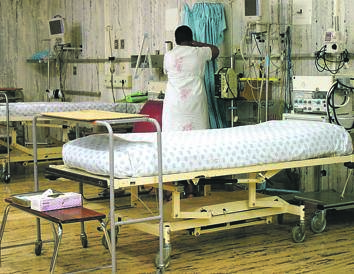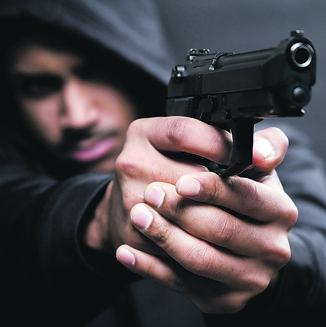
As the country goes into Covid-19 mode it is important to remember that not a single person in SA has died from it yet. But more than 20 people are shot and killed in SA every day. We must call this what it is: a public health epidemic, write Sithombo Maqungo, Richard Matzopoulos and Andrew Nicol
The outbreak of the Covid-19 coronavirus, which has infected more than 135 000 people in more than 120 countries and territories across the world, was declared a Public Health Emergency of International Concern by the World Health Organisation (WHO) on January 30.
It has killed more than 5 000 people.
In response, countries across the world, including South Africa, have kicked their health systems into high gear to contain the spread of the virus and stop new infections.
At the time of writing, not a single person has died from Covid-19 in South Africa.
Today in South Africa, more than 20 people will be shot and killed and more than 130 will survive an incident of gun violence, but often with severe disabilities.
That means almost 1 000 South Africans will have died due to gunshot injuries since the WHO’s declaration.
These daily shootings activate a response from the health system as teams of health professionals working in emergency, treatment and rehabilitation services act to save the lives of people who have been shot.
Currently, the trauma unit at Groote Schuur Hospital in Cape Town treats approximately 90 gunshot patients a month – about three a day.
Data from the Centre for Disease Control in the US show that gunshot wounds are 18 times more deadly than stab wounds, and that one in three people who are shot will die.
A 2017 study to assess the burden of orthopaedic firearm injuries at Groote Schuur conservatively estimated that treating an orthopaedic gunshot wounded patient used just over three hours of theatre time per operation, and necessitated a hospital bed for an average period of 9.75 days.
These direct hospitalisation costs pale in comparison with the persisting economic and social burden carried by gunshot victims themselves, their families and communities.
Ever more people need this specialist care and are suffering the associated negative long-term physical, economic and social effects as gun violence has progressively increased since 2010.
Nationally, guns have overtaken knives as the weapon most used in murders. In Gauteng, more people are shot and killed than die in motor vehicle accidents.
Comprehensive monitoring at mortuaries across the Western Cape puts that province in a position to accurately monitor death profile changes over time.
The province’s 2019 Burden of Disease report graphically highlights the marked increase in gun violence since 2010 – not only have guns replaced knives as the leading weapon used in murder, the data show that, while deaths from sharp objects, blunt force trauma, strangulation and combination assault remained relatively stable from 2010 to 2016, gun-related deaths doubled from 17 to 35 per 100 000 people in this period.
The marked and steady increase in gunshot deaths nationally from 2010 reversed the continual decline observed from 2000, a trend that published research has linked to stricter gun control coinciding with the phased implementation of the Firearms Control Act in 2000.
This initial decline was followed by an increase since 2010, which has been ascribed to poor enforcement of gun control measures nationally as a result of poor administration of the Firearms Control Act and, in the Western Cape in particular, an influx of illicit weapons from criminal syndicates.
This increase in gun deaths is not part of a general trend demonstrated by an increase in murder by other methods.
In fact, it is possible that the minister of police would not even be reporting annual increases in homicide if it were not for the incredible spike in murders involving the use of guns.
To date, the response of health professionals to the increasing number of gunshot injuries has largely been reactive, involving the downstream treatment and care of gun violence survivors.
As gunshot patient numbers have increased, we have adapted and normalised an abnormal situation in our hospitals.
For example, we have adopted techniques developed by the military to get patients through massive trauma.
This would change if gun violence was treated as what it is in South Africa – a public health epidemic.
A key step to reversing an epidemic is to interrupt transmission of the vector of illness/injury or death – be this a virus or a gun.
In 2016, the most comprehensive study of firearm control undertaken, which systematically reviewed 130 studies from 10 mostly high-income countries, found that the simultaneous implementation of laws targeting multiple firearms restrictions was associated with reductions in gun deaths.
Examples of successful gun control are not limited to high-income settings.
As well as the South African example, a recent article in the Bulletin, a monthly public health journal published by the WHO, reported that the introduction of gun-carrying restrictions in the South American cities of Bogota and Medellin in Colombia was associated with a significant reduction in gun homicides.
Bogota and Cali, Colombia’s third major city, had reported similar decreases in gun homicides 10 to 15 years previously, following restrictions on firearms.
The challenge in Colombia, as in South Africa, seems to be to ensure sustained efforts to maintain strict gun control.
As a country confronting an epidemic, our focus needs to shift from gun violence treatment to upstream prevention.
As we track where the first Covid-19 cases in South Africa originated and how best to slow the spread of the virus, so we must ask questions about the guns being used to kill and injure: What are the sources of the firearms used in interpersonal violence and other criminal actions, and how best can these be disabled?
Asking these questions helps move the discussion on gun crime, violence and ownership away from emotional and individual responses to an evidence-led and holistic understanding of how gun violence spreads in communities.
And, more importantly, how it can be stopped.
Dr Maqungo, Dr Matzopoulos and Professor Nicol are members of the Trauma Advocacy Group at the University of Cape Town. Maqungo and Matzopoulos are members of Gun Free SA’s board
 | ||||||||||||||||||||||||||
Get in touchCity Press | ||||||||||||||||||||||||||
| ||||||||||||||||||||||||||
| Rise above the clutter | Choose your news | City Press in your inbox | ||||||||||||||||||||||||||
| City Press is an agenda-setting South African news brand that publishes across platforms. Its flagship print edition is distributed on a Sunday. |




 Publications
Publications
 Partners
Partners









